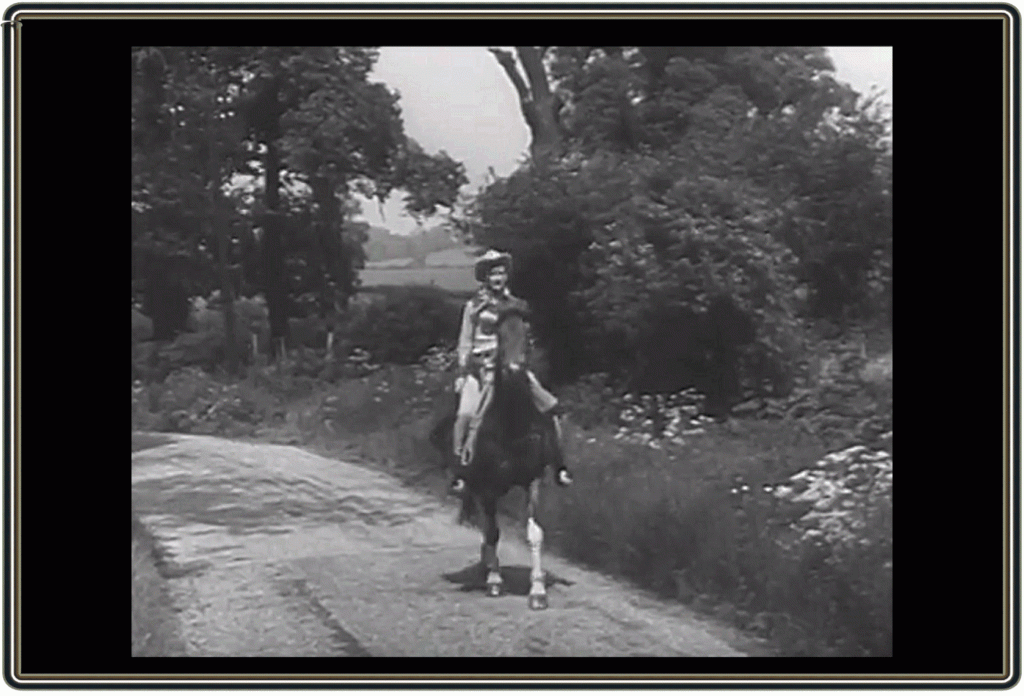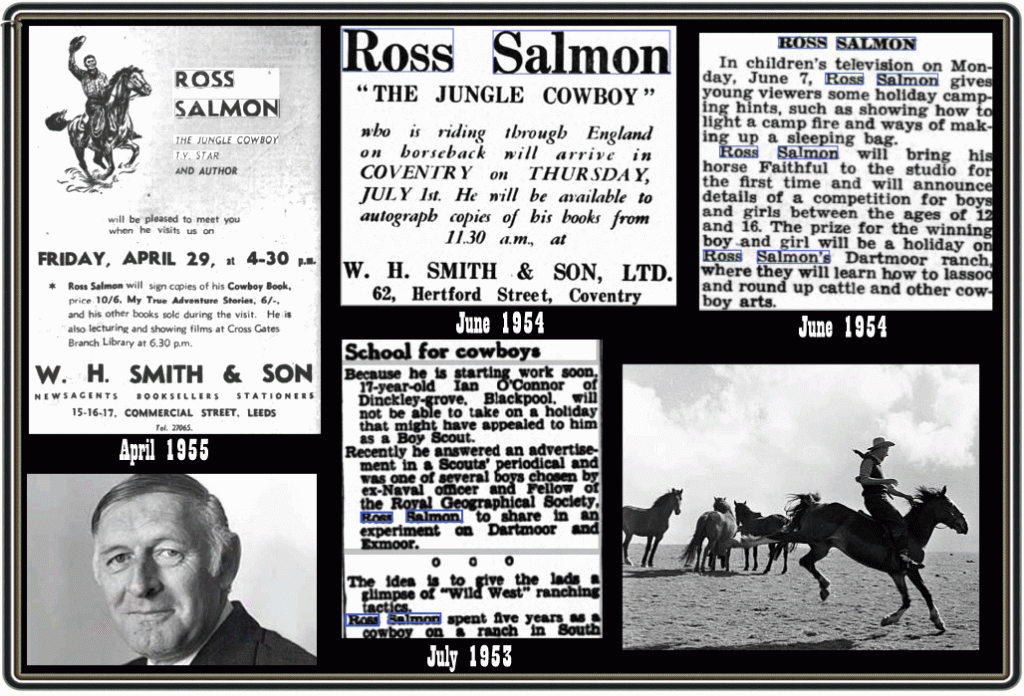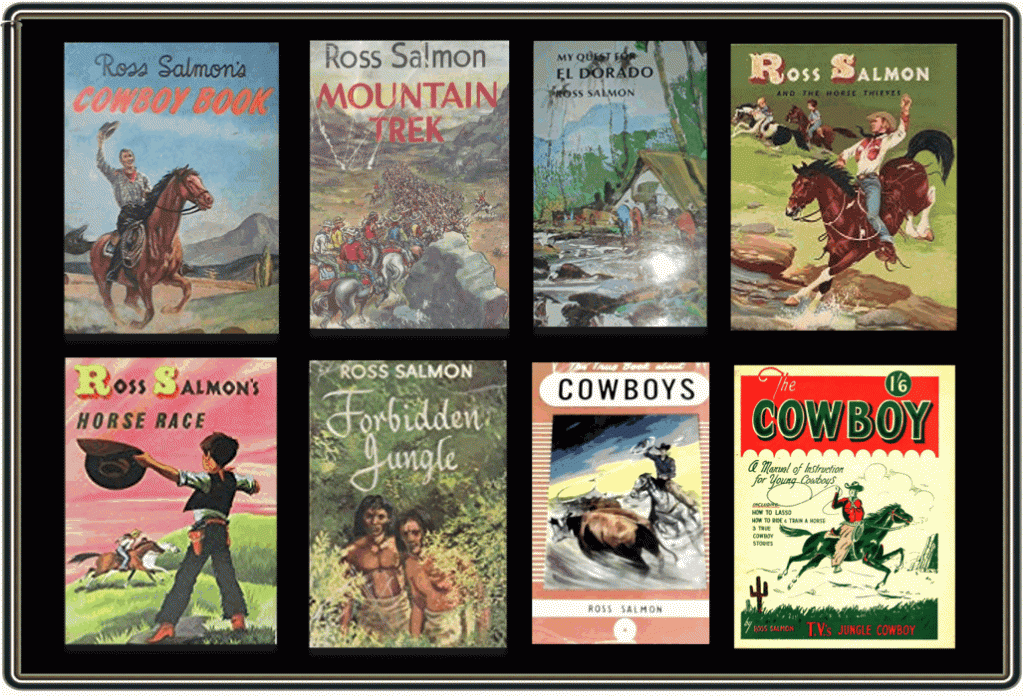
What comes to mind when the word ‘Range’ is mentioned on Dartmoor? The chances are that images of red flags, military activities, firing notices and warning signs are likely candidates. But what about cowboys riding through such places as Deadman’s Bottom or Sniper’s Gully as they round up their steers – less likely? But back in the 1950s you may well have seen some cowboys rounding up steers, and one in particular – Ross Salmon, affectionately known as ‘The Dartmoor Cowboy’ from the ‘Lazy S’ ranch. But that was only part of his extraordinary life which involved his many exploits and talents.
Ross Salmon was born in Harrow in 1922 where in his younger years he displayed some promise as a sportsman excelling in cricket and football. During World War II he became a teenage navy pilot which saw some interesting times. On one of his missions he was flying a Lysander deep behind enemy lines on which were two Norwegian twins, there job was to spy on Germans and get plans of the Nazi atomic bomb. It was the information that these men gleaned that lead to the famous commando raid on the heavy water installation at Telemark. On another occasion he flew a Tiger Moth biplane under the arches of a bridge. A stunt which was highly dangerous and definitely illegal but did lead to him being recruited into the newly formed S.A.S. After D-Day he commanded numerous raids deep into Europe as the commander of ‘Force T’ for which he was awarded the Distinguished Service Cross. During his wartime exploits Salmon was twice shot down by friendly blue on blue fire. One of these occasions involved some Canadian troops who were mustered in the Solent prior to the D-Day landings. For whatever reason they thought he was in an enemy aircraft and so shot it down the result of which was an emergency landing on the Isle of Wight.
After the war in 1947 Ross Salmon applied for a job as a ranch assistant for a cattle company in South America. This post he successfully gained and spent the next year rounding up, branding, and tending cattle. Not long after this he became manager of his own ranch in Columbia which consisted of 32 square miles of South American jungle. During this time he took a keen interest in the indigenous peoples of the continent. Sadly his initial connection with South America came to an abrupt end when he was involved in a serious plane crash in which he sustained 14 major bone fractures. His life was saved by some natives who transported his broken body by means of passing him from tribe to tribe until western medical help could be found. Once he was fit enough to fly he was transported back to England where he spent a year in London’s Bart’s Hospital.
In the early 1950s he and his wife moved to Devon where he established the ‘Lazy S’ ranch on Dartmoor. Apart from farming the other purpose of this was to run holidays for underprivileged children in which they were taught to be ‘cowboys’. It was at this time he acquired the nickname of ‘The Dartmoor Cowboy’, a reporters’ account of a visit to his ranch read:
“It started as a rumour in a pub on the edge of Dartmoor. The landlord said there was talk that the boss of the Lazy S outfit was hiring cow-hands for the autumn round-up. An ancient farmer thumped the scrubbed floor with his stick; “What do they be wantin’ with cowbouys on Dartmoor? he grumbled, “All Devon knaws it be sheep country!” The regulars nodded solemn assent but I pricked up an eager ear. “Whichaway to the Lazy S old-timers?” I asked. Silently they pointed north… And that is how I came to be climbing the steep, boulder-strewn trail to the Lazy S ranch, 500 feet above Exeter. A lean man in a stetson slouched against the ranch house gate lazily rolling a cigarette. “Howdy,” I drawled, “Down at the saloon the boys are saying the boss is looking for cowhands.” “I’m the boss,” he grinned. “Care for a cuppa?” Tea in the old corral? it could only happen in England.
But in the ranchouse kitchen thirty-two year old Ross Salmon explained his experiment with deadly seriousness. With his ranching experience he was trying to raise beef Western style on 2,500 wild acres of Dartmoor. Helping him are two experienced cowboys. Tasmanian Jack and Canadian John who herd the fifty head of cattle that are branded with the Lazy S – an ‘S’ lying on its side.
Down at the corral I met Canadian John. “You’ve sure got the right stomach to tote a couple of six guns,” he said politely. But I was staring fearfully at the horses rearing and plunging in a savage swirl of dust. “Wonderful spirit these Dartmoor ponies have,” beamed Ross. “Some of them can throw you in three seconds and then turn around and either kick you or bite you.” He spun a lasso adding; “Which one d’you fancy?” “Give him Boxer,” said Canadian John, ” He’s good and fresh.”
The rope settled round the arched neck of a sinister looking piebald with flattened ears. Ross slung a saddle across the quivering animal and stood aside with the air of a chauffeur opening the door of a limousine. I sidled forward and Boxer seemed to wink. I put my foot in the stirrup – and the ground punched me in the back. “Cut the clowning,” said the boss of the Lazy S. “We’ve got work to do.” With the futile fury of a spider climbing the inside of a bath I tried again and scrabbled into the saddle. The ground looked far away, but I uttered a brave, “Yippee.” It seemed to annoy the piebald. He reared up dancing on his hind legs like an insane toad and neighing with rage. I lost the stirrups and reigns. I bounced like an agonised punchball above the bucking saddle. and I shot over his head and smacked onto the ground on my head.
I remembered Ross’s words, “They come back and bite you,” and tried to scramble up. But the pony was too quick, he was standing over me, bared teeth inches from my left ear. I closed my eyes and felt something wet against my cheek. The diabolical pony was licking my face and I’ll swear he was chuckling. “Say Bud, when was you last on a horse?” cackled Canadian John. “That WAS the last time,” I said stiffly and hobbled away to turn in my stetson, neckerchief and my cowboy boots. From now on I’ll ride the range from the front row stalls and rejoice in the name of Greenhorn.”
The combination of his children’s ranch holidays and his ranching expertise lead to a career in television where he became known as ‘TV’s Jungle Cowboy.’ This entailed teaching his cowboy skills to groups of enthralled children as can be seen in this Pathe News film of 1953 – HERE. In addition to the television appearances Ross also published eight books about his experiences as a cowboy, amongst these were; Jungle Cowboy, Forbidden Jungle, My True Adventure Stories, True Cowboy Tales, True Jungle Stories, Mountain Trek, Cowboy, Ross Salmon’s Horse Race, My Quest for El Dorado, and High Jungle. In 1954 Salmon decided he wanted to undertake an expedition to South Africa for the Royal Geographical Society. In order to prove he was fit for such a challenge he launched a mini expedition which involved riding through England on horse back. The injuries he received in his plane crash in South America had resulted in him suffering from osteo-arthritis and having to wear a back brace hence the trial England horse ride. As can be seen above this also gave him the opportunity to promote his books and meet up with his young fans.
It was in the January of 1954 that Salmon had his own Dartmoor adventure which proved worthy of his wartime S.A.S. exploits. On Monday the 31st of December Salmon had been staying at Dartmoor’s Fox and Hounds Inn. Having taken lunch he rode his horse ‘Faithful’ up to the moor in order to round up some of his cattle. At the old peat works by the Rattlebrook the horse stumbled and threw him off. Somehow he manged to keep hold of the reigns as his frightened mount sped off and was dragged for some distance. Before letting go of the reigns he knotted them which would be a signal to anyone who found the horse that its rider had been dismounted. When he did not return to the inn the alarm was raised and local search parties sent out. In the meantime Salmon had literally crawled around the moor for a good nineteen hours in frosty temperatures of five degrees. He was making for one of the range huts in which he hoped to find a telephone. Finally he reached one but to his dismay he couldn’t manage to reach the door handle. Eventually he found enough nearby rocks with which would give him a platform with which to reach the handle. After an hour’s struggle through true grit and determination Salmon manged this when to his dismay he found it locked. Following this set-back he courageously carried on crawling across the moor in an effort to find assistance. It was not until the following afternoon that an R.A.F. plane from Roborough spotted the riderless horse and circled overhead as a guide to the search parties. Thankfully the ‘posse’ of searchers soon found the ‘Dartmoor Cowboy’ and he was taken to the Royal Devon and Exeter Hospital. It was soon reported that he was ‘shaken not stirred’ with no broken bones and was recovering well. Oddly enough some people were soon saying that this ‘adventure’ was a staged publicity stunt to which his response was; “Some people seem to have suggested that my ordeal on Dartmoor was a hoax, but it was no stunt, I assure you!” He also added; “Posing as a super-fit cowboy to children has been rather a fraud, I haven’t been fit for years. Now I.m packing up my ranch and all that it means to me. I shall never ride again.”
Ross Salmon’s career became centred on the media when he got his first major job was scoring a darts matches in Plymouth, Bristol and Southampton for BBC South West. He then progressed as a sports presenter where he began scoring cricket matches for the BBC. Thanks to his various expeditions and films in South America he became a fellow of the Royal Geographical Society and a fellow of the Royal Anthropological Institute for his work on the native peoples of South America. In later years Ross Salmon had been suffering failing health for a long time and on the 14th of April 2004 he passed away at the age of eighty.
 Legendary Dartmoor The many aspects past and present of Dartmoor
Legendary Dartmoor The many aspects past and present of Dartmoor



